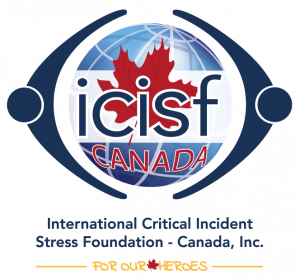

IN A CRISIS? Please call 9-8-8 24/7/365 or go to 988.ca
Get Help | 9-8-8: Suicide Crisis Helpline
Connect to a crisis responder to get help without judgment.
International Critical Incident Stress Foundation-Canada
Email: info@icisfcanada.com
Ph: 1-780-953-CISM (2476) Fax: 1-587-521-0100
The ICISF Model of peer support is referred to as Critical Incident Stress Management (CISM). CISM is a comprehensive, integrated, systematic, and multi-component psychosocial support program specifically designed to meet the needs of public safety personnel.
CISM includes crisis intervention techniques shown to be effective for those seeking support after impacted by a critical incident or traumatic event. A peer relationship, and the delivery of the specific CISM Technique is used to provide; a sense of normalization, foster a sense of affiliation, as well as assist an impacted individual to reestablish their disrupted natural coping strategies.
A critical incident is any unusual event that has the power to overwhelm one’s usual coping strategies and elicit a psychological crisis where thoughts are impacted, and emotions become dominant. This disruption can create a state of emotional turmoil causing significant human distress.
Critical Incident Stress are the normal and common reactions in response to any stressful event. These events can be critical, or normal life events. The key to understanding the concept is that it is not the nature of the event that is the focus of determining if it is a “critical incident” but the impact on those who experienced it.
These common reactions manifest in the 5 Domains of Stress Reactions:
A traumatic event is when the critical incident is particularly grotesque, horrific, or life-threatening. The specific type of stress response that gets activated by the nervous system is called a threat response which prepares the organism for anticipated bodily harm constricting the blood vessels to prevent excessive bleeding and increasing the body’s inflammatory response to promote healing. This response is functional in the short term if in present danger of acquiring bodily harm, however, in modern civilized societies most people are not facing present or imminent danger but how we perceive the stressors and threats in our social and physical environments can turn on the same threat response having very negative consequential effects on our health and well-being. It is important to note here that the threat response can also be activated by exposures to critical incidents as well as life events as some people develop a preferential default to this type of response when experiencing any kind of adversity, however, a traumatic event is more likely to consistently elicit a threat response more frequently with greater severity regardless of who you are. Reactions to traumatic events are identical to critical incident stress and manifest in the same 5 domains of common reactions, however, are called Post-Traumatic Stress.
Post-Traumatic Stress (PTS) are natural and normal responses to a very abnormal experience, the traumatic event. When there is a disruption to the natural recovery process where these symptoms of PTS linger beyond 30 days post-incident, and along with DSM-V diagnostic criteria, that is when we see PTS turn into a PTSI (Post-Traumatic Stress Injury) such as Depression, Anxiety, Substance Abuse Disorder or PTSD (Post-Traumatic Stress Disorder). PTSIs require a referral to a culturally competent third-party registered mental health professional who is trained in the assessment and delivery of trauma related evidence-based mental health treatments.
Despite the disruption and unpleasantness these reactions may cause, it is important to remember that Critical Incident Stress and Post-Traumatic Stress a like, are natural and normal reactions to an abnormal event, they are our body and brain’s natural way of responding to adversity so that we can learn and grow from our experiences.
Copyright © 2020-2024
International Critical Incident Stress Foundation, Inc. (ICISF-Canada, Inc.)
All Rights Reserved